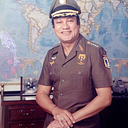“Drug traffic: a crime against humanity” report by Panama Defense Forces 1986
The following are excerpts from the Introduction of the report “Panama: 16 years of struggle against drug traffic.” 1986
. . .The government of Panama shares the opinion that drug trafficking is one of the worst crimes against humanity, comparable with nuclear bombing of innocent people. Both phenomena are examples of the most criminal form of genocide. The addiction to drugs exists because there is drug trafficking, hence the necessity to combat this terrible scourge at the source.
In spite of the proven fact that the government of Panama acts in efficient cooperation with the responsible authorities of the United States of America, unfounded accusations against Panamanian officials appear sporadically. These accusations are designed to incriminate said officials with illicit activities related to the drug traffic. The circumstances and timing of these accusations, as well as the manner in which they have been made public, have given the great majority of the Panamanian people good reason to react with a feeling of founded suspicion over the probable political intentions.
Facing this curious situation, the government of the Re public of Panama considered it opportune to elaborate this extensive documented summary, directed principally to the conscience and reason of the responsible leaders of the great North American nation. The purpose is to demonstrate through an almost chronological sequence of facts and events, that the government of Panama ranks among the forerunners in the fight against drug trafficking in all its shapes and forms. In order to better appreciate the position occupied by Panama in the war against the drug traffic, a sincere effort should be made to understand very well the geography, geo politics, and strategic aspects of the evolution of the isthmus of Panama….
Owing to its special geographic location, Panama has historically been the crossroads of the Americas. During the Spanish colonial era, the isthmus of Panama was known as “the route to silver” and from 1848, when gold was discovered in California, it was called “the route to gold.”
During the various periods of its history, as was the case in 1501, Panama has been the victim of the most varied forms of piracy and plundering, such as the famous fairs of Portobelo, which awakened the greed of pirates who converted that part of the isthmus of Panama into an ambush area.
During a more recent period, criminal international merchants have tried to use the isthmus of Panama as a transit route for drugs produced in various South American countries, and for drugs coming from Europe via South America, on its way to the great consumer market of the United States of America.
Generally, the drugs are not distributed within the Panamanian territory, they simply pass through by air or maritime transport.For this specific reason, the Panamanian authorities have the capacity to intervene solely when the drugs are disembarked, which happens in relatively few cases at our international airports, or the maritime ports of Cristobal and Balboa.It should be kept in mind that these two sea ports were reverted to the sovereignty of Panama as recently as 1978. These ports were formerly under the jurisdiction of the United States as part of the Canal Zone.
Nevertheless, it is obvious that Panama constitutes a tar get for the illicit drug traffic and because of this, Panama is fully aware that the effective struggle against the traffic of and addiction to drugs cannot be limited to unilateral action of one state within its own frontiers, it must be a multilateral campaign by all nations of the world….
It is the pennant policy of Panama, within the fineness and vigor of this war against drugs and the addiction to drugs, that the international community must act with a new purpose, namely with respect for human dignity.We must re member that, historically, massive addiction to drugs was promoted, and imposed by force, by Great Britain, through the introduction into China from India of the cultivation and use of opium. That sale of opium was simply and plainly international drug traffic on a monopolistic basis.It was done officially by the British Empire with the conviction that it was possible to assault the life and health of a backward nation without affecting the empire itself. But today it is a problem that concerns the whole world. It is an issue of such gravity, that it should never be utilized for immoral purposes, but used as a rationale to force a universal mobilization of all institutions and organizations for the vigilance and eventual eradication of the drug traffic and the use of illegal drugs.. ..
It is not the purpose of this brief introduction to enter into a detailed summary of all the efforts and joint actions by the governments of the United States of America and the Republic of Panama, or by the respective authorities directly responsible for fighting the illegal drug traffic.
Nevertheless, since this is a matter to which the principal Panamanian authorities have pledged their dedication and offered their supreme efforts, presented below is a brief summary, through which, in a clear and objective manner, the highly positive results that come from tight and permanent cooperation against the criminal drug traffic, can be appreciated.
